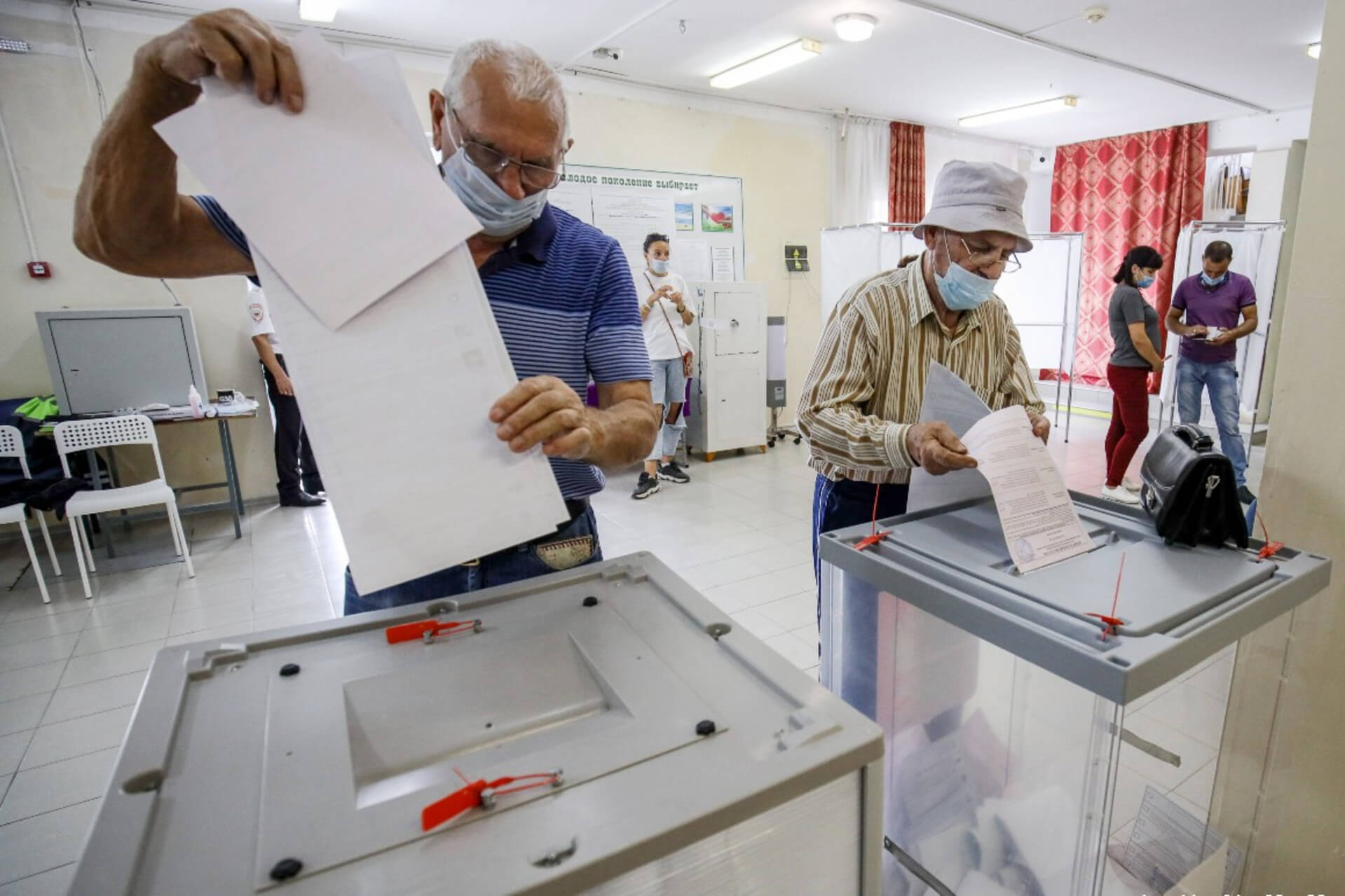Russian President Vladimir Putin’s United Russia party won the parliamentary elections held between September 17-19 by a sweeping margin on Monday. The party won nearly 50% of the total votes, whereas its only significant rival, the Communist Party, secured just 19% of votes.
The scale of victory indicates United Russia will have more than two-thirds of deputies in the 450-seat State Duma lower house of the parliament. It will also enable the Putin-led party to implement and act upon laws without any considerable contestation from other parties.

The colossal win has raised significant suspicion in Russia and beyond, as pre-vote opinion polls and projections indicated a fall in votes for United Russia owing to years of discontent over rising levels of poverty, corruption, inflation, and an overall decline in living standards.
The Russian opposition “called foul” on the elections, stating that it was “heavily rigged” and falsely won via “mass fraud.” “I refuse to recognise this State Duma as legitimate,” tweeted Yevgeny Roizman, a former mayor of Yekaterinburg and prominent opposition figure.
Following the announcement of results, the Communist Party called for protests and organised a rally in downtown Moscow, retaliating against the “illegitimate” election. The Communist candidates, including sought-after leader Valery Rashkin, fell behind on votes minutes before the results were declared online. “These results are implausible; that’s why I’m calling for all the candidates who have lost to electronic voting to gather tonight to discuss what to do next,” Mikhail Lobanov, another defeated Communist candidate, told the Moscow Times.
The protests were banned by Moscow’s mayor, citing COVID-19 restrictions. Even then, around 200 people gathered at the Pushkin square where Communist Party candidates Rashkin, Denis Parfenov, and Sergey Obukhov addressed the voters.
A Meduza article mentioned clear violations of election protocols during the election and vote-bank manipulation after the election. “Election monitors reported violations such as carousel voting and ballot stuffing, and flagged instances of unusually widespread and rapid at-home voting,” the article read.
The article also included the following claims that further problematise the elections and bring under scrutiny its legitimacy and fairness:
- Attempts to report election violations sometimes ended in physical attacks.
- St. Petersburg police arrested around a dozen members of precinct election commissions throughout the voting period.
- Observers reported dozens of violations at polling stations after voting ended, including the presence of unidentified individuals and safes containing ballots being left out of view of surveillance cameras during the night.
The article also highlighted that employers pressured civil servants and workers into casting their votes online and favour United Russia. “The management told me voting was part of my duties. They said it was not a choice,” a 34-year-old Moscow-based teacher told Moscow Times during the early days of the election process. Civilians also accused the government of “voter intimidation” at the workplace, particularly within the public sector, which makes up most of Russia’s jobs.
Furthermore, Russian media outlet Taiga.info leaked audio of an official from the Putin-led party instructing poll watchers to “ignore voter fraud at the upcoming election.” Pro-government election monitors in St. Petersburg were “instructed on how to write about the elections on social media,” reported the Telegram channel Rotonda.
The Russian elections were held after a month-long crackdown on all forms of dissent, such as the silencing, sanctioning, and criminalising of independent media outlets, journalists, and digital and social media platforms, including Google, Facebook, and Twitter. Additionally, the government barred opposition parties’ rights to campaigning, notably banning allies of Kremlin-critic Alexei Navalny, who is currently imprisoned in Russia, from partaking in the polls. The state also restricted Navalny’s “smart voting” campaign that urged Russians to look beyond United Russia.
In light of these events, the international community spoke against the Russian elections, chiming in with the country’s domestic opponents and concerned voters to reprimand the United Russia party.
The United States (US) State Department alleged that the elections were unfair. “The September 17-19 Duma elections in the Russian Federation took place under conditions not conducive to free and fair proceedings. The Russian government’s laws on ‘extremist organisations’, ‘foreign agents’, and ‘undesirable organisations’ severely restricted political pluralism and prevented the Russian people from exercising their civil and political rights. We call upon Russia to honour its international obligations to respect human rights and fundamental freedoms and to end its pressure campaign on civil society, the political opposition, and independent media,” US spokesperson Ned Price said in an official statement.
Price added that the US does not recognise the Russian Duma election on Ukrainian territory. “We do not recognise holding elections for the Russian Duma on sovereign Ukrainian territory and reaffirm our unwavering support for the territorial integrity and sovereignty of Ukraine,” he said.
At the same time, Britain’s foreign ministry called the vote “a setback for democratic freedom and at odds with the international commitments that Russia has signed up to.” In addition, European Union foreign policy chief Josep Borrell stated that the bloc noted reports of serious violations during the elections.
However, Ella Pamfilova, the head of the Russian election commission, stressed the vote was “exceptionally clean and transparent.” In her meeting with Putin before the election results on Monday, she said, “It [the elections] was a challenge because we had to deal with unprecedented attacks and a massive and unprecedented effort to thwart and discredit our elections.”
Amid the large-scale suspicion and allegations of mass fraud, Putin thanked Russians for their “trust in him” after the results were declared. “Special words of thanks, of course, I want to address to the citizens of Russia, to thank you for your trust, dear friends,” he said on national television.

